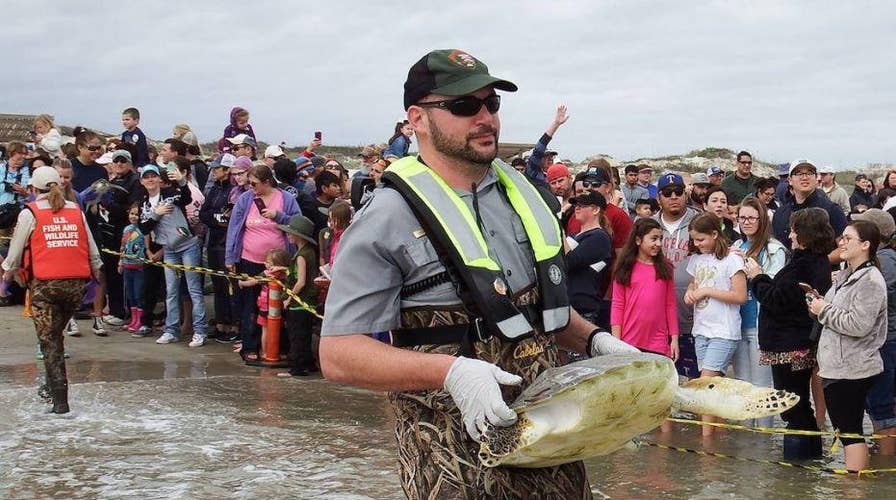Rescued sea turtles released back into Gulf of Mexico
Hundreds of green sea turtles are being released back into the Gulf of Mexico after they were rescued last week from chilly waters.
Hypothermic sea turtles that were on the brink of death last week along the Texas Gulf Coast are recovering and being released back into the wild.
More than 2,000 “cold stunned” turtles were rescued out of frigid gulf waters from New Years Day through Friday, in what is now the largest cold stunning event since 1980.
“I haven’t had much sleep,” said Donna Shaver, Texas Coordinator of the Sea Turtle Stranding and Salvage Network.
NEARLY 1,000 SEA TURTLES RESCUED ALONG TEXAS GULF COAST
Shaver organized the enormous rescue effort that spanned almost the entirety of the Texas Gulf Coast. The National Parks Service led the rescues with help from Sea World San Antonio, U.S. Fish and Wildlife Service, Texas Parks and Wildlife Department, ARK and the Texas Sea Life Center.
The effort was especially difficult Thursday and Friday because many turtles had been exposed to 40-degree water for almost a week.
“I put on Facebook a post asking for help from my volunteers, I was desperate,” said Shaver.
SCIENTISTS DISCOVER OVER 100 NEW SPECIES, INCLUDING CROCODILE LIZARD, SNAIL-EATING TURTLE
The turtles recovered at three local animal rehablitiation facilities -the Texas State Aquarium, Texas Sea Life Center, and ARK.
Nearly 400 turtles were released back home Sunday afternoon. The event brought 2,500 people to Padre Island National Seashore to watch, much like the popular sea turtle hatchling releases. Hundreds more turtles will be released Monday and Tuesday.
“It’s just release after release,” said Shaver.
PYTHON HUNTER KILLS MONSTER 17-FOOT SNAKE IN FLORIDA EVERGLADES, SETS NEW RECORD
Conditions should be much more favorable for the sea turtles this week. After air temperatures dropped below freezing and wind chills hit the teens last week, Corpus Christi’s forecasted high was above 70 for Monday. Warm air will quickly increase shallow water temperatures where many of the turtles live.
While most of the turtles will go back into the wild, approximately 500 were found dead, or died soon after being rescued. The breadth of the cold made it very difficult to get the turtles out of the water, and some were stuck for many hours if not days.
“It’s really hard to get to them all before some perish because our events are state wide,” said Shaver. “Other areas of the country are also having cold stunning but that’s in pockets.”
The remaining turtles that survived but aren’t ready to be released will likely have a slow recovery. According to Shaver, some of them will have to be put down.
“The likelihood of them surviving and being able to survive in the wild is minimal,” said Shaver.









































